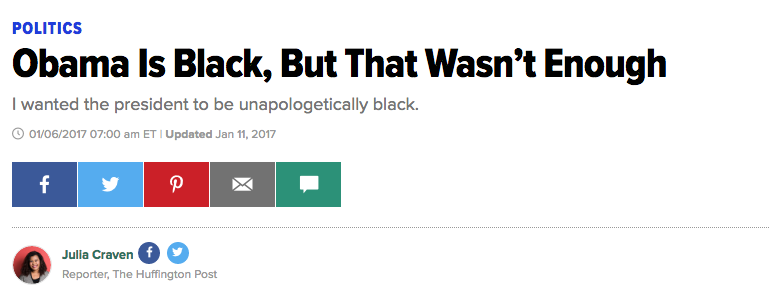Why can't progressives celebrate incremental progress?
Don't let the perfect be the enemy of the good

A free daily email with the biggest news stories of the day – and the best features from TheWeek.com
You are now subscribed
Your newsletter sign-up was successful
Nothing is perfect.
That's as true in politics as it is in all other aspects of our lives. Not even the most devoted supporter could plausibly argue that America's first black president was perfect. The same is true of the historic nomination of Hillary Clinton, or of the biggest mass demonstration in U.S. history.
That doesn't mean Barack Obama's presidency, Hillary Clinton's nomination, or the Women's March on Washington were progressive failures. They were, in many cases, very good for progressives. They marked real, meaningful progress. They just weren't perfect.
The Week
Escape your echo chamber. Get the facts behind the news, plus analysis from multiple perspectives.

Sign up for The Week's Free Newsletters
From our morning news briefing to a weekly Good News Newsletter, get the best of The Week delivered directly to your inbox.
From our morning news briefing to a weekly Good News Newsletter, get the best of The Week delivered directly to your inbox.
But all too often, progressives seem inclined to make the perfect the enemy of the good.
After the Women's March on Jan. 21 — which inspired an estimated 3 to 4 million to rally for women's rights in cities across the U.S. and around the world — progressive critiques immediately started rolling out.
#womensmarchnyc #blacklivesmatter #blackwomenmatter #protectwomenshealthA photo posted by Khudejha (@deejbeej) on Jan 21, 2017 at 11:28am PST
None of this is to say that these assessments are invalid, incorrect, or without merit. Many transgendered Americans did feel unfairly left out of the Women's March. A big percentage of white women did vote for Donald Trump. And the American left in general, and the Women's March specifically, surely has a long way to go before achieving the laudable goals of intersectionality. And obviously, any member of any group has the right to speak up when they feel excluded. The march undoubtedly could have been more diverse, more self-aware, and more pointed in its cause.
In fact, not even Clinton — who arguably achieved the biggest mark of progress for women in 2016, even if she fell short of the ultimate goal — made the cut on the Women's March's list of honorees. The March's oversight spurred further dissatisfaction, giving birth to the hashtag #AddHerName.
A free daily email with the biggest news stories of the day – and the best features from TheWeek.com
Obviously, this isn't the first time women have debated how warmly to embrace Clinton. No woman should feel compelled to support a political candidate just because of a shared gender identity. But for proponents of equality and women's rights, Clinton's historic nomination should have offered at least some cause for celebration. But many bristled: They wanted a woman, just not this woman.
Feminist Camille Paglia, for one, refused to celebrate a woman who has "ridden" on her husband's "coattails." An intersectional feminist suggested the color of Clinton's skin made it hard for her to fully appreciate Clinton's accomplishment. "The election of a white woman to the highest office doesn't say a whole lot about my feminism," said Imani Gandy, co-host of the This Week in Blackness Prime podcast.
Obama, too, has faced criticism from the left for not being enough:

Though columnist Julia Craven gives a nod to how Obama is seen "as an indication of how much black Americans can accomplish," she criticizes Obama for avoiding appearing "too black," causing him to fall short of "fully doing what needed to be done to improve race relations."
The writer wasn't alone in thinking that. Van Jones, Obama's former special adviser on green jobs, said that "sometimes it felt like he was president of everyone except black people." Activist Al Sharpton conceded Obama "never gave [the black community] a bill that hurt us," but he "would have liked to see the Obama years do more."
Those are legitimate criticisms of Obama. But so often these days, "not enough" is equated with failure rather than what it actually is: good but not great.
Things can always be better. And activists of all stripes should never stop striving toward something better. Indeed, progress could never be achieved if people simply sat back and said "good enough." But progress is often incremental. Even when a step in the right direction carries with it traces of society's multitudinous shortcomings and failures and inequalities, it can still count as forward motion. Sometimes it's okay to celebrate the good, even if the good is far from perfect.
The Women's March wasn't a flawless demonstration. But millions of people still showed up and took a stand for what they care about and believe in. Clinton might not be the ideal feminist, and her campaign was certainly not free of poor decisions, but at least we can finally say a woman won a major political party's presidential nomination — and the country's popular vote. Obama might not have made as much progress as some hoped he would, but at least, after 43 white men, America finally had a black president.
These evaluations may seem to lack nuance. But at their core, each of these accomplishments still contains an obvious win for liberal values that can — and should — be celebrated. And if liberals can only be satisfied when perfection is reached, they will never satisfied.
-
 6 of the world’s most accessible destinations
6 of the world’s most accessible destinationsThe Week Recommends Experience all of Berlin, Singapore and Sydney
-
 How the FCC’s ‘equal time’ rule works
How the FCC’s ‘equal time’ rule worksIn the Spotlight The law is at the heart of the Colbert-CBS conflict
-
 What is the endgame in the DHS shutdown?
What is the endgame in the DHS shutdown?Today’s Big Question Democrats want to rein in ICE’s immigration crackdown
-
 The billionaires’ wealth tax: a catastrophe for California?
The billionaires’ wealth tax: a catastrophe for California?Talking Point Peter Thiel and Larry Page preparing to change state residency
-
 Bari Weiss’ ‘60 Minutes’ scandal is about more than one report
Bari Weiss’ ‘60 Minutes’ scandal is about more than one reportIN THE SPOTLIGHT By blocking an approved segment on a controversial prison holding US deportees in El Salvador, the editor-in-chief of CBS News has become the main story
-
 Has Zohran Mamdani shown the Democrats how to win again?
Has Zohran Mamdani shown the Democrats how to win again?Today’s Big Question New York City mayoral election touted as victory for left-wing populists but moderate centrist wins elsewhere present more complex path for Democratic Party
-
 Millions turn out for anti-Trump ‘No Kings’ rallies
Millions turn out for anti-Trump ‘No Kings’ ralliesSpeed Read An estimated 7 million people participated, 2 million more than at the first ‘No Kings’ protest in June
-
 Ghislaine Maxwell: angling for a Trump pardon
Ghislaine Maxwell: angling for a Trump pardonTalking Point Convicted sex trafficker's testimony could shed new light on president's links to Jeffrey Epstein
-
 The last words and final moments of 40 presidents
The last words and final moments of 40 presidentsThe Explainer Some are eloquent quotes worthy of the holders of the highest office in the nation, and others... aren't
-
 The JFK files: the truth at last?
The JFK files: the truth at last?In The Spotlight More than 64,000 previously classified documents relating the 1963 assassination of John F. Kennedy have been released by the Trump administration
-
 'Seriously, not literally': how should the world take Donald Trump?
'Seriously, not literally': how should the world take Donald Trump?Today's big question White House rhetoric and reality look likely to become increasingly blurred